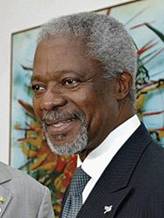PNND Update 15
December 2006
1. UN Secretary-General on the "Greatest Danger"
 |
|
Kofi Annan, UN Secretary-General |
|
On 28 November, UN Secretary-General Kofi Annan gave a major policy speech at Princeton University in the United States.
In possibly his final major speech before retiring from the UN, Annan listed some of the major threats confronting humankind that require collective and comprehensive action. These include economic and social threats (poverty, environmental degradation and infectious disease), conflicts between and within States, and terrorism.
However, Annan noted that the greatest danger requiring action is that of nuclear weapons. “Even a single bomb can destroy an entire city, as we know from the terrible example of Hiroshima and Nagasaki, and today, there are bombs many times as powerful as those. These weapons pose a unique threat to humanity as a whole.”
Annan criticized countries for talking this issue selectively and from two polarized paths. One of these is promoted by the ‘non-proliferation first’ advocates (including the Nuclear Weapon possessing States) who take no action on their own stockpiles but attempt to prevent anyone else from acquiring nuclear weapons. The other path pursued by the ‘disarmament first’ advocates who are hesitant to support stronger non-proliferation measures while the NWS make no progress on disarmament.
Annan expressed concern that because of inaction, the world is not only “sleepwalking towards disaster. In truth, it is worse than that – we are asleep at the controls of a fast-moving aircraft. Unless we wake up and take control, the outcome is all too predictable.”
The answer, according to Annan, is to work on both nonproliferation and disarmament. “An aircraft, of course, can remain airborne only if both wings are in working order. We cannot choose between non-proliferation and disarmament. We must tackle both tasks with the urgency they demand.”
2. Nobel Peace Laureates on nuclear abolition and nonviolence
 |
|
Nobel Peace Laureates drafting nuclear abolition appeal |
|
Nobel Peace Laureates meeting at an historic Summit in Rome from 17th - 19th November 2006 released a powerful declaration passionately calling on the world community to act now to abolish nuclear weapons in order to prevent a nuclear catastrophe. The Laureates agreed that:
“Nuclear weapons are more of a problem than any problem they seek to solve. In the hands of anyone, the weapons themselves remain an unacceptable, morally reprehensible, impractical and dangerous risk.”
“The failure to address the nuclear threat and to strengthen existing treaty obligations to work for nuclear weapons abolition shreds the fabric of cooperative security. A world with nuclear haves and have-nots is fragmented and unstable, a fact underscored by the current threats of proliferation. In such an environment cooperation fails. Thus, nations are unable to address effectively the real threats of poverty, environmental degradation and nuclear catastrophe.”
Senator Emeritus Douglas Roche (Chair of the PNND Global Council) and Jonathan Granoff (Member of the PNND Global Council) were active in the summit as representatives of Nobel Peace Laureate organizations Pugwash and the International Peace Bureau.
 |
|
PNND Global Council Member Jonathan Granoff speaking at the Nobel Peace Laureates Summit |
|
Jonathan Granoff, in a keynote speech to the Nobel Summit, noted that “Trillions of dollars have been spent to develop the existing arsenals, and well over 110 million dollars are squandered each day to keep them primed and ready,” and that “Nuclear weapons cannot distinguish between combatants and civilians. How can we, in good conscience, tolerate threats in our names, through our own governments, to level these horrors upon millions of normal, peaceful, law abiding, innocent people? To use a nuclear weapon against another nuclear weapon state is suicidal. To use a nuclear weapon against a non-nuclear weapon state is patently immoral.”
 |
|
PNND Chair Senator Douglas Roche at the Nobel Peace Laureates Summit with former South African President De Klerk and IPB President Tomas Magnusson. |
|
Senator Douglas Roche called on all people to take action for nuclear disarmament and not to wait for action by the nuclear weapon States. “Middle power countries, working in a non-adversarial environment, and focusing on goals for which there is virtual agreement, can and must build a framework to repair the non-proliferation regime.”
(See Presentations delivered to the 7th World Summit of Nobel Peace Laureates)
The Summit also adopted a Charter for a World Without Violence, which outlined a practical and achievable program for nonviolently resolving conflicts, preventing aggression, overcoming oppression and achieving justice at inter-personal, community, national and international levels.
The Charter notes the necessity of non-violence: “No state or individual can be secure in an insecure world. The values of non-violence in intention, thought, and practice have grown from an option to a necessity.”
And the Charter heralds the possibility of a better world through nonviolence: “We are convinced that adherence to the principles of non-violence will usher in a more peaceful, civilized world order in which more effective and fair governance, respectful of human dignity and the sacredness of life itself may become a reality.”
The Charter for a World Without Violence and the Call for Nuclear Abolition are extremely useful documents that parliamentarians can use to help promote nuclear disarmament and peace. Previous declarations from the Nobel Peace Summits have been tabled (submitted for the record) in various legislatures including the US Congress. Nobel Peace Summit organizers hope that these two documents will find even more resonance internationally.
3. Parliamentary support for nuclear abolition
Friends of the Earth is encouraging parliamentarians to use Kofi Annan’s nuclear abolition speech and the Nobel Peace Laureate’s Call for Nuclear Abolition to strengthen the resolve of their own governments to implement the nuclear disarmament obligations of the nuclear Non-Proliferation Treaty. They have proposed that parliamentarians:
a) Table or enter-into-the-record of their parliaments Kofi Annan’s speech and/or the Nobel Peace Laureate’s Call
b) Adopt a resolution calling for action to implement Kofi Annan’s speech and the Nobel Peace Laureate’s Call (See draft resolution)
c) Use this as an opportunity to endorse the joint parliamentarians and mayors statement for a nuclear weapons free world
4. PNND roundtable on North East Asia postponed
Due to changed circumstances, PNND had to cancel an international parliamentary roundtable on Options and Possibilities for Denuclearization in North-East Asia, which was to have been held in the Japanese Parliament on December 6. PNND will re-schedule this roundtable for a future date.
|


